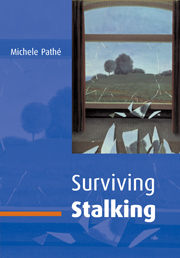Book contents
- Frontmatter
- Contents
- Acknowledgments
- Introduction
- 1 What is stalking?
- 2 How common is stalking?
- 3 Who stalks?
- 4 Could I be assaulted?
- 5 Can stalkers be treated?
- 6 Who are the victims of stalking?
- 7 The impact of stalking
- 8 Reducing your chances of victimization
- 9 Evading the stalker
- 10 Navigating the criminal justice system in the United States of America
- 11 Navigating the criminal justice system in the United Kingdom
- 12 Navigating the criminal justice system in Australia
- 13 Should I just disappear?
- 14 How do I deal with the emotional impact of stalking?
- 15 How you can assist victims of stalking
- Conclusions
- References
- Reading guide
- Appendix 1 Other resources
- Appendix 2 Protection from Harassment Act 1997
- Appendix 3 Sample restraining order under Protection from Harassment Act 1997
- Appendix 4 Criminal justice system flow chart, UK
- Index
15 - How you can assist victims of stalking
Published online by Cambridge University Press: 04 September 2009
- Frontmatter
- Contents
- Acknowledgments
- Introduction
- 1 What is stalking?
- 2 How common is stalking?
- 3 Who stalks?
- 4 Could I be assaulted?
- 5 Can stalkers be treated?
- 6 Who are the victims of stalking?
- 7 The impact of stalking
- 8 Reducing your chances of victimization
- 9 Evading the stalker
- 10 Navigating the criminal justice system in the United States of America
- 11 Navigating the criminal justice system in the United Kingdom
- 12 Navigating the criminal justice system in Australia
- 13 Should I just disappear?
- 14 How do I deal with the emotional impact of stalking?
- 15 How you can assist victims of stalking
- Conclusions
- References
- Reading guide
- Appendix 1 Other resources
- Appendix 2 Protection from Harassment Act 1997
- Appendix 3 Sample restraining order under Protection from Harassment Act 1997
- Appendix 4 Criminal justice system flow chart, UK
- Index
Summary
Our society is becoming increasingly aware of the fact that stalking is a crime and that it is widespread. As noted earlier, many people today will have some familiarity with stalking phenomena. Raising awareness about stalking and its many consequences has been an important advance, but now our understanding of these behaviours must inform more constructive approaches to their elimination, and to the assistance that is provided to stalking victims.
Victims of stalking often complain that instead of understanding they receive comments and ‘advice’ that reinforce their sense of guilt and self blame. Rather than support they experience abandonment; they fear for their safety but their pleas for help are ignored or trivialized. The following are some suggestions as to how various significant figures in the lives of stalking victims, both informal and more traditional sources of assistance and support, can have a more positive impact on the outcome. These are based on observations in clinical practice and the comments of victims themselves. It is not intended to be an exhaustive doctrine and the reader is referred to earlier chapters and to the reading guide at the end of this book for more detailed information relating to stalking and its effects on its victims.
Family and friends
If you too are being threatened or are otherwise at risk from the stalker make sure you have taken every reasonable step to secure your safety.
- Type
- Chapter
- Information
- Surviving Stalking , pp. 127 - 134Publisher: Cambridge University PressPrint publication year: 2002



